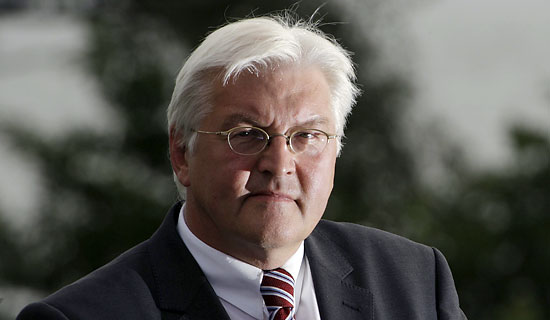We Americans are so consumed by US presidential politics that we’ve nearly forgotten that Germans will be going to the polls next year. But events over the weekend have reminded us of this fact in a big way. The Social Democrats (SPD) have made a very shrewd decision:
Kurt Beck quit as the leader of
Germany’s ruling Social Democratic Party, clearing the way for
Foreign Minister Frank-Walter Steinmeier to be the party’s
candidate for chancellor at next year’s national election.
Beck, whose popularity plunged to record lows during his 2
1/2-year tenure, said in a statement that he had asked
Steinmeier to contest the September 2009 election against Angela
Merkel in his place. He will be replaced as party chairman by
Franz Muentefering, 68, a former vice-chancellor who clashed
with Beck over plans to unpick labor-market policies before
leaving front-line politics to care for his sick wife.
Steinmeier, 52, speaking during a televised press
conference outside Berlin today, said he and Beck “agreed that
the party must make a new start” to be at once “strong at the
center and end factional fighting.” He added that it was “a
hard day” for the Social Democratic Party, known as the SPD.
Steinmeier is the only German politician more popular than Angela Merkel. He is a fixture on the international stage and has the reputation for cool competence. I wrote earlier about how the SPD was losing members; this move could reverse course give the party new momentum, since Steinmeier has a reasonable chance to assume the chancellery. Kurt Beck’s erratic course has been damaging. Of course, there are risks with Steinmeier as well: he was one of the architects of Gerhard Schröder’s reform policies that have alienated many on the left and contributed to the growth of the LEFT party. But Steinmeier has a talent for for coordination and building consensus, and that is what is required in a political system that relies on coalitions. Franz Walter points this out in Der Spiegel:
Das deutsche Regierungssystem prämiert Koalitionsfähigkeit, nicht
Spitzenkandidatencharisma. Daher wäre die richtige Frage in der
Kandidatendebatte der SPD gewesen: Wer schöpft das Koalitionspotential
am besten aus? (The German system of government puts a premium on the abilities of building coalitions, not the charisma of the candidate. That would be the right question to ask in the candidate debate in the SPD. Who is in the position to take advantage of the opportunities for coalitions?}
Of course, not everyone is thrilled with the events over the weekend. The old SPD hand Albrecht Müller of NachDenkSeiten is appalled that his party would turn over its future to pollsters and lobbyists:
Steinmeier wird auf diese Weise zum Kanzlerkandidaten gemacht werden.
Das gründet nicht auf Leistung, nicht auf begründeten Wahlchancen und
auch nicht auf der inneren Willensbildung der SPD-Gliederungen. Es
gründet auf Propaganda, die sich leicht zu arrangierender Umfragen
bedient. Und auf dem Willen der Bertelsmänner, der Springer, der
Wirtschaft etc.. (So this is how Steinmeier is picked to be the candidate for chancellor. It has nothing to do with performance, nor a realistic chance for the election nor the internal support of the SPD membership. It is based on propaganda that makes use of opinion polls that are easily manipulated. And it is based on the desires of Bertelsmann, Springer and big business….)
I think, however, that most realists and pragmatists will go along with the decision as the only viable course for a party that was falling into irrelevance.


